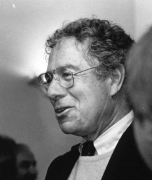
Richard Bender
Professor Emeritus of Architecture
Dean of the College of Environmental Design
Professor Emeritus of Architecture Richard Bender passed away on October 8, 2022, at the age of 92. Bender was an architect, civil engineer, planner, and educator, known for his urban, campus and community designs. Bender served as Dean of the College of Environmental Design from 1976 to 1988.
Bender was born in Brooklyn, NY. He received a bachelor’s degree in civil engineering from the City University of New York in 1951. Bender then pursued graduate work in Building Construction Engineering at MIT and the Graduate School of Design at Harvard, receiving his M.Arch from the latter in 1956. Following graduation, he married artist and writer Sue Rosenfeld. They lived in Europe for two years before returning to New York where Bender worked with Paul Lester Wiener and José Luis Sert on new towns in Latin America and taught at Cooper-Union.
At the invitation of Gerald McCue to teach at UC Berkeley, Bender moved to the west coast in 1969. On campus, Bender served as Chair of UC Berkeley’s Department of Architecture, Associate Dean for Research, Dean of the College of Environmental Design and Director of the Campus Planning Study Group and the Urban Construction Laboratory. His work in these programs led him to direct master plans for the University of California System campuses, including UC Berkeley, UC San Diego and UC Santa Cruz. As Visiting Scholar John J. Parman recently recounted, “His real monument, though, is the Berkeley Campus, which he saved from being paved over by enlisting then-Chancellor Albert Bowker to explain the campus to itself and to preserve the campus’ sense of place as it grew. He also added design review by faculty and outside professionals to the process by which new buildings were proposed, sited, and developed.” In recognition of service that “exceeds the standards of excellence” to the University of California Berkeley, Bender was awarded the Berkeley Citation in 1986. Professor Bender was also honored in 2012 with the creation of the Richard Bender Fellowship at CED. The Fellowship, established by an anonymous donor, supports a dual-degree graduate student in the Department of City and Regional Planning and the Department of Architecture, who focuses on the design of affordable housing in livable communities.
Perhaps Bender’s most influential work is A Crack in the Rear-View Mirror: A View of Industrialized Housing (Van Nostrand Reinhold, 1973), a timeless book on this topic. Bender was also founding director of the BRIDGE Housing Corporation, the Bay Area’s largest home-building nonprofit. He also oversaw a substantial research program, funded by the National Science Foundation and what was then the National Bureau of Standards, that set the stage for Department of Energy funding and the creation of the Center for the Built Environment within CED. He also served as visiting "GC-5" Professor of Urban Design and Construction at Tokyo University, advised the design and construction of The Getty Center in Los Angeles and directed master plans for the Benesse Art Site on the Island of Naoshima, Japan and Nanyang Technical University in Singapore. As Mr. Parman noted, “Dick saw things that others overlooked, influencing work at different scales and timelines. He was especially good at considering a project’s impact on the surrounding city.”
Beyond his work, Professor Bender maintained a summer home in the Hamptons that was a showcase for artwork by sculptor Tino Nivola and other artists in and around Amagansett on Long Island.
Professor Bender is survived by his wife, sons Michael and David, and their families. "Until his last hours, he remained incredibly proud of and excited by his association with the CED," Michael Bender shared. "This was manifested several ways, primarily by sharing the pride of the work of colleagues and especially former students.”
